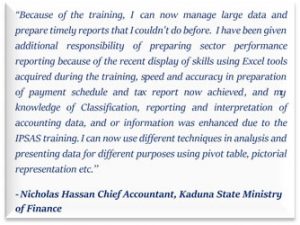 Many states in Nigeria have faced challenges due to inadequate public financial management capacity of personnel responsible for the oversight of financial transactions in the state ministries, departments, and agencies (MDAs). One of the implications of this huge gap is the inability of some of the state personnel to effectively use financial management tools which in turn impedes effective financial reporting. Kaduna,like many other states shares these similar challenges. This led the State Government to recognize the need to reform and strengthen the financial management capacity of relevant personnel across key MDAs in the state.
Many states in Nigeria have faced challenges due to inadequate public financial management capacity of personnel responsible for the oversight of financial transactions in the state ministries, departments, and agencies (MDAs). One of the implications of this huge gap is the inability of some of the state personnel to effectively use financial management tools which in turn impedes effective financial reporting. Kaduna,like many other states shares these similar challenges. This led the State Government to recognize the need to reform and strengthen the financial management capacity of relevant personnel across key MDAs in the state.
Based on the results of a capacity assessment, conducted by Health Systems Consult Limited (HSCL) through the Global Fund Resilient and Sustainable Systems for Health (RSSH) project, the root causes of poor financial management capacity were identified and recommendations were proferred to address identified challenges. To facilitate the implementation of key recommendations, training for finance personnel of relevant ministries, departments, and agencies (MDAs) on the financial management tools, functions, and applications was convened. Targeted participants for the training included LGA accountants, chief accountants, auditors, and finance officers who were drawn from the State Ministry of Health, Kaduna State Aids Control Agency (KADSACA), State Primary Health Care Development Agency (SPHCDA), Ministry of Finance and Budget and Planning Commission. The objective of the training was to strengthen the capacity of relevant finance personnel on the use the MS Excel software and the application of International Public Sector Accounting Standards (IPSAS), Budget and Treasury Management Information System (BATMIS) for financial reporting.
In all, a total of a hundred and twenty-one (121) participants were trained in three batches. The participatory approach adopted for the training ensured that the trainees were engaged in lively discussions about the issues surrounding their challenges with the tools, the application of the principles of IPSAS and that the identified challenges were adequately addressed. Some of the immediate results from the training was increase in the level of the capacity of participants which was noticed from the various practice exercises that took place during the training. An analysis of the feedback from participants showed that most viewed the training as being important to their day to day functions while also recognizing the importance of the learning approach adopted which allowed them address challenges themselves. In the long run, these skills gained will enable them to complete their tasks in their various organizations more efficiently, managing, assessing, and analyzing of data will also become an easy task.
participants were trained in three batches. The participatory approach adopted for the training ensured that the trainees were engaged in lively discussions about the issues surrounding their challenges with the tools, the application of the principles of IPSAS and that the identified challenges were adequately addressed. Some of the immediate results from the training was increase in the level of the capacity of participants which was noticed from the various practice exercises that took place during the training. An analysis of the feedback from participants showed that most viewed the training as being important to their day to day functions while also recognizing the importance of the learning approach adopted which allowed them address challenges themselves. In the long run, these skills gained will enable them to complete their tasks in their various organizations more efficiently, managing, assessing, and analyzing of data will also become an easy task.





